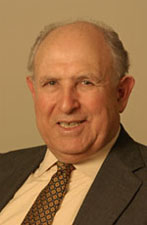Journalist in Residence 2009

USCET was pleased to welcome Bernard Gwertzman, the Consulting Editor of the Council on Foreign Relations’s cfr.org website and formerly the Foreign Editor of the New York Times and Editor-in-Chief of its Web Edition, to China as its Journalist in Residence in September 2009.
Mr. Gwertzman’s career spans over four decades and has taken him across the globe. After starting his career at the Washington Star, he moved to the New York Times and served as its Moscow Bureau Chief during the Cold War. Later, he moved into an editorial position as the Times’s Foreign Editor for six years and as the first Editor-in-Chief of its Web Edition. As a measure of his standing in American journalism, the New York Times won four Pulitzer prizes for international coverage under Gwertzman’s leadership.
Traveling to Hangzhou, Shanghai and Beijing during September 2009, Gwertzman delivered lectures at:
- Beijing Foreign Studies University;
- China Institutes for Contemporary International Relations (CICIR);
- Renmin University;
- Shanghai Institute for International Studies;
- Shanghai Jiaotong University;
- Tongji University; and
- Zhejiang University.
He shared his experience as a journalist in US and addressed on the rise of Internet journalism, the media coverage of American foreign policy, and comparison between Chinese and American journalism. In addition, Gwertzman joined some small group Q&A sessions, offering Chinese students better access to the JIR.
This year’s JIR program again validated the impact of American journalists’ direct engagement with students and faculty at Chinese schools of journalism and communications, as well as research institutes. Gwertzman spoke directly and passionately regarding the merits of a free press and open discourse, generating engaged and active audience participation in questions and discussion. His background gave Gwertzman credibility in addressing issues related to how the media affects US-China relations, a hot topic among all Chinese audiences. Gwertzman also was able to dispute deep-seated Chinese skepticism that the American media does not do the bidding of the US government, just like the Chinese media. Given his award winning tenure as Foreign Editor of the New York Times, Gwertzman’s accounts of the US courts’ consistent protection of press freedoms as well as the context of (very infrequent) interactions between government organs and the Times related to editorial decisions (for example, on the occasion of the publication of the Pentagon Papers), were inspiring.
Gwertzman also developed several high-impact discussion formats. At several presentations, he reviewed the New York Times web edition projected on a screen along with leading Chinese English-language media, The China Daily and Global Times. He commented on the newspapers’ editorial selections, compared their coverage of the events of the day, and analyzed US and Chinese coverage of selected issues, driving home differences between an independent press and one controlled by the government. He spoke from a perspective of experience that left a lasting impression on students and faculty alike, reinforcing USCET’s sense that the JIR program serves as a cost-effective means of stretching the envelope in Chinese journalism education.
During his stay in Beijing, Mr. Gwertzman accepted interviews with Chinese mainstream media, Caijing magazine and Global Times.
